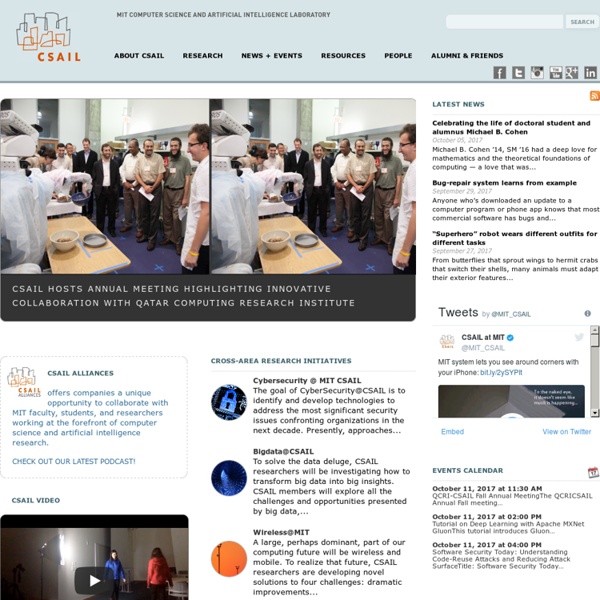



Nutch Latest step by Step Installation guide for dummies: Nutch 0.9 By Peter P. Wang, Zillionics LLC Try the search engine I developed for The Christian Life: Malachi Search Please support my effort by using the best free/low price web hosting: 1&1 Inc peterwang@zillionics.com To add your comments, please go to: Install software one by one First, install cygwin: run cygwinSetup.exe. Second, install JAVA: run dk-6u3-windows-i586-p.exe Third, install Apache: run apache-tomcat-6.0.14.exe. Run it by clicking the Configure Tomcat icon below. Click the Start button below to start Apache Tomcat Service. Then you will be able to see the following screen in the browser if you go to Fourth, unzip nutch-0.9.tar.gz to any directory you like, e.g. c:\nutch. Setup the crawler In Cygwin window, go to the directory of your nutch, and set your JAVA_HOME as follows.. +^ <name>http.agent.name</name>
The AI Revolution: Road to Superintelligence - Wait But Why PDF: We made a fancy PDF of this post for printing and offline viewing. Buy it here. (Or see a preview.) Note: The reason this post took three weeks to finish is that as I dug into research on Artificial Intelligence, I could not believe what I was reading. It hit me pretty quickly that what’s happening in the world of AI is not just an important topic, but by far THE most important topic for our future. We are on the edge of change comparable to the rise of human life on Earth. — Vernor Vinge What does it feel like to stand here? It seems like a pretty intense place to be standing—but then you have to remember something about what it’s like to stand on a time graph: you can’t see what’s to your right. Which probably feels pretty normal… The Far Future—Coming Soon Imagine taking a time machine back to 1750—a time when the world was in a permanent power outage, long-distance communication meant either yelling loudly or firing a cannon in the air, and all transportation ran on hay. 1. Speed.
Downloads | Predictics Portal A virtual laboratory is a special simulation program with the following characteristics. It is designed as an implementation of a mathematical model and its behaviour is restricted by the validity of the model rules. The actions of model entities can be modified by changing the parameters of its environment and/or the entities interaction rules. Moreover, the concept of the virtual laboratory is a natural way to explain an abstract experiment in an interpersonal communication. Virtual laboratory design makes it possible for an experimenter to change model parameters easily, which with adequate visualization also enables the use of the laboratory as an educational tool.
Project AIRE -- Projects AIRE Group Projects Tools for collaboration support: We are creating components of software infrastructure capable of supporting interactions among people, spaces and mobile devices on scales ranging from single rooms to inter-continental multi-person collaborations. Software infrastructure for human-centric pervasive computing: Collaboration support is the main target application area where we apply and evaluate our technology. Novel Human-Computer Interfaces: We are developing and evaluating new interfaces for people to interact with their environments. AIRE spaces e21 is our longest-running facility, a conference room instrumented fully with ubiquitous technologies. e21 is a working conference room, used constantly for informal and formal meetings, exploring the use of ubiquitous technologies for meeting support, demonstrations, and vision-based tracking applications. Several Ki/o kiosks have already been installed around the AI Laboratory. Software and hardware components
The Open Graph Protocol Our Evolutionary Journey Design Rationale CBCL Homepage HTTrack Website Copier - Offline Browser AI in 2025 Remco Chang Teaching 2014 Spring: Computer Graphics 2013 Spring: Visualization 2012 Fall: Visual Analytics and Provenance Recent Activities Congrats! Congratulations to Dr. Award! Really honored to have received the 2013 Tufts University School of Engineering Faculty Mentoring Award Recent Publications Dynamic Workload Using fNIRS to dynamically adjust the workload of the user in a simulated UAV routing task. CHI 2014 (pdf) Locus of Control Priming locus of control to change user's behaviors when using a visualization IVI 2014 (pdf) Affective Priming Priming a user's emotional state influences their ability to perform visual judgement CHI 2013 (pdf) (video) Research Overview MIT Talk My talk at the HCI Seminar at MIT CSAIL on LOC, interaction logging, and interactive metric learning. Research - Visual Analytics Individual Differences Model and predict user behavior based on their cognitive states and traits (chi13)(chi13)(vast11) Interactive Visual Machine Learning (vast12)(isvc10)(cgf09) Analytic Systems Recent Grants
MIT Computational Cognitive Science Group Brain Computing History About CSAIL | MIT CSAIL The Computer Science and Artificial Intelligence Laboratory – known as CSAIL – is the largest research laboratory at MIT and one of the world’s most important centers of information technology research. CSAIL and its members have played a key role in the computer revolution. The Lab’s researchers have been key movers in developments like time-sharing, massively parallel computers, public key encryption, the mass commercialization of robots, and much of the technology underlying the ARPANet, Internet and the World Wide Web. CSAIL members (former and current) have launched more than 100 companies, including 3Com, Lotus Development Corporation, RSA Data Security, Akamai, iRobot, Meraki, ITA Software, and Vertica. The Lab is home to the World Wide Web Consortium (W3C), directed by Tim Berners-Lee, inventor of the Web and a CSAIL member. “At CSAIL, we believe that computation is the key to creating a successful future. The AI Lab was founded as the AI project in 1959.